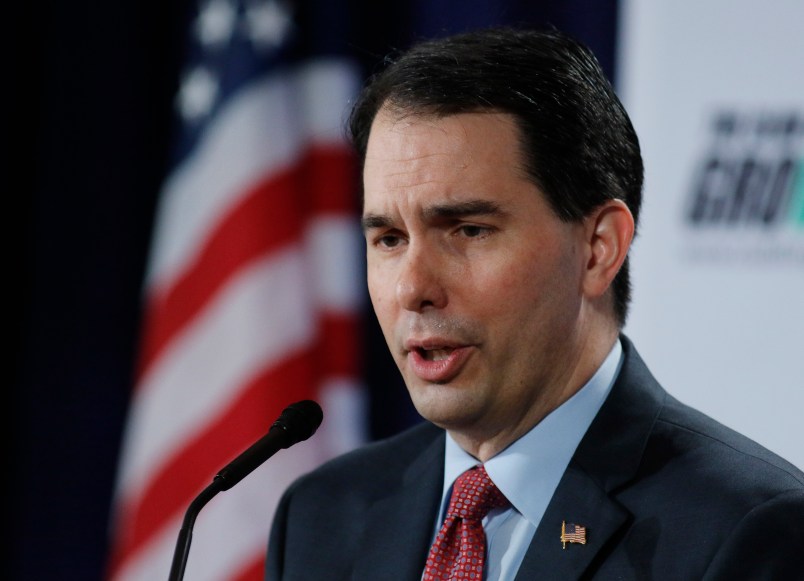MADISON, Wis. (AP) — Four years after taking union rights away from teachers and other public workers in Wisconsin, Gov. Scott Walker now wants to strip job protections for University of Wisconsin professors in a move he likens to the 2011 law that made him a national figure and set up his expected presidential run.
Eliminating tenure in state law, as Walker proposed in January and a Republican-controlled legislative committee approved earlier this month, is part of a larger overhaul of higher education policy that he is talking about to Republican voters around the country.
Walker and Republican backers defend his higher education proposal as empowering university leaders to be more like a business and nimble in how they govern. University professors and their supporters, both in Wisconsin and nationally, are raising alarms that it’s an attack on academic freedom that could gain momentum in other states.
“Within the higher ed universe, this is being seen as an extremely consequential, signal event,” said Barmak Nassirian, director of federal relations and policy analysis at the American Association of State Colleges and Universities.
A companion effort would take from professors and staff certain decision-making powers about campus issues including curriculum, research and faculty status. Combined with ending tenure in state law, the higher education proposal would be the first of its kind in the country, Nassirian said.
“Obviously the faculty are opposed, but there are plenty of folks who look at it and believe this, in fact, is the future,” Nassirian said, citing the increasing pressure on universities to be more efficient in light of escalating tuition costs. “And it may be.”
Wisconsin faculty members are sounding alarms that the changes will lead to a flood of departures for universities with stronger tenure. A petition signed by more than 450 of the university’s award-winning researchers asked lawmakers to reconsider.
More than a dozen faculty members came to a Board of Regents meeting with tape over their mouths, holding signs of protest. That’s a far cry from the 2011 protests at the state Capitol that grew to as many as 100,000 people when Walker went after public workers’ union protections.
Still, Walker openly makes comparisons. This is “Act 10 for the university,” he says, invoking the title of the union law.
Opponents say protests could grow, and extend beyond Wisconsin. Henry Reichman, vice president of the American Association of University Professors and chairman of its committee on academic freedom and tenure, said the proposed changes in Wisconsin could embolden faculty both there and around the country to become more organized as Walker mounts his expected run for the Republican nomination.
“One message to higher ed would be you really don’t want to support Scott Walker for president because if he can do it in Wisconsin, he will do it everywhere,” Reichman said.
Walker, who attended Marquette University but did not graduate, initially proposed cutting the university’s state aid by 13 percent, or $300 million. Budget writers in the Legislature have reduced the proposed cut to $250 million, while still voting to eliminate tenure in state law, leaving it up to the university’s regents to set a policy as is done in every other state.
But the Legislature’s budget committee went even further, proposing to change the law to make it easier to fire those with tenure. Now, tenured faculty members can only be fired for just cause or if there’s a financial emergency. Under the new provisions, the administration could fire them “when such an action is deemed necessary due to a budget or program decision requiring program discontinuance, curtailment, modification or redirection.”
The Legislature is expected to vote on the proposals this month or next, when passing a state budget. Walker has been campaigning for the GOP nomination for months, in all but name, but says he won’t announce his decision until the budget is passed.
In taking tenure out of state law, the legislation would let the Board of Regents set its own policy on that matter. But with 16 of the 18 regents appointed by the governor, taken together with the broader authority under state law to fire faculty, opponents of the move say the resulting policy is bound to be feckless.
“Tenure will be gone as we know it and I think it’s a step backward for our relationship with faculty members,” said Tony Evers, who serves on the Board of Regents in his capacity as state superintendent. Evers fought against Walker’s union restrictions against teachers and other public workers four years ago and signed the petition that led to the 2012 statewide vote over recalling Walker from office. Walker won that vote.
___
Follow Scott Bauer on Twitter at https://twitter.com/sbauerAP
Copyright 2015 The Associated Press. All rights reserved. This material may not be published, broadcast, rewritten or redistributed.







Nope. This is the future for any failed state that believes that education is just some worthless sector of the economy that’s completely fungible to the point of dismissal (and yeah, I’m looking at Louisiana and Kansas). My home state of New York has problems but we do value higher education.
Yes, Scotty, piss off one group of voters at a time.
I recall the late George Wallace going after “pointy headed intellectuals,” – you know, them enemies of us workin’ folk who think they’re better’n us.
Of course those rising tuition costs are being largely driven by cuts to state higher education funding, so it’s another case where republicans deliberately created a crisis which they then exploit to ram through the policies that they actually want.
Unions? Crushed, Now on to those Universities which have been a hotbed of liberal thought. I wonder who the next target on their enemies list is?
The future that Walker sees is not one we can afford. His political career needs to end.
Biggest republican house slave. Reap what you’ve sewn Wisconsin. Because you’ve turned your state into-a feudal system of serfs and indentured servants who only exist to serve the rich.